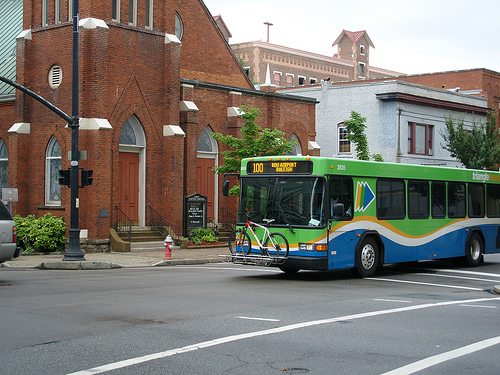CORRECTION APPENDED: The original story indicated the North Carolina DOT would begin major road work on I-440 next year. The work is set to begin this fall.
Proponents of a half-cent sales tax to pay for increased bus service and commuter rail in Wake County said recently they will no longer push for the tax to be added as a referendum on the fall 2013 ballot.
Tappan Vickery, with WakeUp Wake County and the Capital Area Friends of Transit, said the organization will wait until at least 2014 to ask again for a ballot referendum.
The news may come as a surprise to some transit advocates, who have followed the passing of similar sales tax referendums in both Durham and Orange counties. Triangle Transit will begin collecting taxes in those two counties April 1; the first bus improvements are expected in early 2014.
Vickery said the change in tactics is due to the political climate in Wake County, where the majority of County Commissioners refuse to consider the tax despite the urging of CAFT and several city and town mayors.
Some Commissioners argue the proposed transit plan is flawed and too expensive. Meanwhile, Commissioners are also working with the Wake County School Board to put a school bond referendum on the fall ballot, leaving transit proponents with what Vickery calls a “hard reality.”
“County Commissioners hold the sole authority to schedule this referendum and that no amount of pressure from the municipalities or the public will sway them from their current commitment to education, the school bond,” she said. “As a result, we were making it worse by pushing for something they were not going to budge on.”
Commissioner Phil Matthews, who has previously voted against discussing the transit plan, said delaying the referendum push is a good idea.
“If we have a school bond, that’d probably be too many bonds for the voting public to have,” he said.
Matthews said Commissioners will begin to discuss transit this year, likely in May, and include outside voices to examine the plan.
“I know they thought we put it on the back burner. It just wasn’t as high up on the priorities as the school bond,” he said. “We still need a lot more information. We’re about numbers, realistic numbers, not speculative.”
Brad Schulz, spokesman for Triangle Transit, said Wake’s financial participation doesn’t relate to the Durham and Orange projects. However, it does mean that commuter rail between Durham and Wake counties will not move forward.

A vision of commuter rail between Wake and Durham counties.
Triangle Transit has also submitted a plan to the Federal Transit Administration for light rail between Durham and Orange counties. That project won’t be operational for about 12 years.
Vickery said she hopes 2014 will present a better situation for transit advocates. This fall, the North Carolina Department of Transportation will begin a rebuild of an 11-mile stretch of Interstate 440 between U.S. 1 and U.S. 64/264.
Commuter rail – A regular rail line, like an Amtrak train, that provides regional service, such as from Raleigh to Durham.
Light rail – A subway/metro style rail typically using electricity that offers transit within a city.
“It is a great hope that we will see progress in 2014, particularly because the I-440 construction is literally going to stop traffic,” she said. “It’s going to be so expansive; I don’t think anyone has a clue how that’s going to affect public and political pressure. With that reality in front of us, we hope the Commissioners will consider moving forward in 2014.”
David King with Triangle Transit said he’s still hopeful that Commissioners will consider the referendum this year, but said it’s not his place to press it forward. The deadline to put the referendum on the Oct. 8 ballot is 90 days prior.
Every year that passes is another year longer before a strong transit network is in place, he said.
“Time is of the essence. We are sounding an alarm to a fire that will be burning in 2020. But that’s tomorrow, so should we be worried about tomorrow today? Of course we should,” he said. “We would be in a better position to absorb the growth we’re all talking about — and which nobody seems to deny is coming — in a more graceful and efficient way.”
Four Commission seats will be up for election in 2014, those held by Matthews, Joe Bryan, Tony Gurley and Paul Coble, all of whom have blocked the tax referendum discussion.
“It’s a shame to lose two years,” King said. “I think two because I don’t think it’s very likely this issue will be move forward at the same time as some of our County Commissioners are running for re-election.”
Commissioner Betty Lou Ward, a transit proponent, said she doesn’t like the idea of waiting another year or two. Still, she said it’s “obvious it isn’t happening anytime soon.”
“It’s ridiculous that Durham County, Orange County put it on the ballot, passed it. All the people in the county agree and we still haven’t put in our agenda to discuss,” she said. “We need to put it on the agenda and discuss it. We need to give Wake County an opportunity to look at see what’s there as opposed to having someone tell them what’s there and what’s not.”
Meanwhile, Vickery said she and others will focus on educating people about the tax and what it will do. Opponents often focus on light rail, something that isn’t even part of the initial plan, she said, and may never happen. The proposed transit plan’s initial focus is on bus service — something not available in all 12 of Wake’s cities and towns.
“The public doesn’t know difference between light and commuter [rail] or that light is not even part of the main plan,” she said. “Doubling of the bus and the commuter rail meet our immediate needs.”
